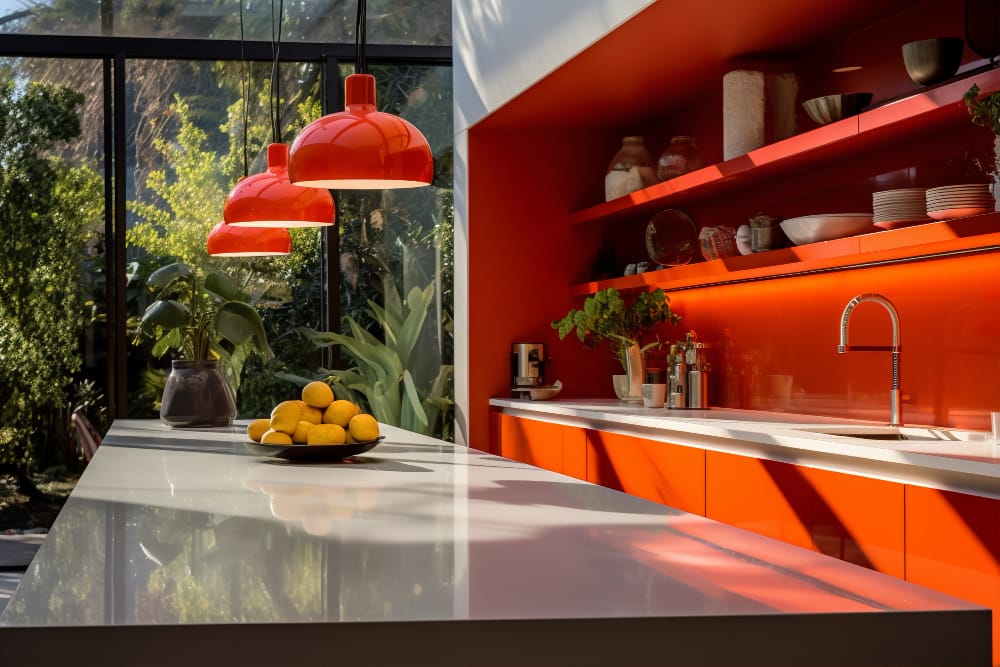Butcher block countertops are a beautiful and durable addition to any kitchen. They are made from solid wood pieces glued together, creating a seamless surface that is perfect for food preparation. However, like any other surface in the kitchen, they require regular cleaning and maintenance to keep them looking and functioning their best.
In this article, we will discuss how to clean butcher block countertops, as well as how to maintain and condition them to keep them looking beautiful for years to come.
Table of Contents
Cleaning Butcher Block Countertops
To clean butcher block countertops, start by removing any items on the countertops and using a microfiber cloth to wipe away any debris. This will help to prevent scratches and other damage to the surface of the countertops.
Next, fill a bowl with warm water and add a few drops of dish soap. Dip a sponge into the solution and scrub the countertops, using circular motions to remove any stains or debris. Be sure to pay special attention to any areas that are particularly dirty or stained.
After scrubbing, use a clean microfiber cloth to wipe away the soap and water. It is important to dry the countertops thoroughly with a clean, dry microfiber cloth to avoid letting excess water sit on the wood. This can lead to mold and rot, which can damage the countertops and create a health hazard in your kitchen.
If there are any stubborn stains, sprinkle salt over the surface of the butcher block countertop, especially on the stains. Cut a lemon in half and scrub it over the stain, then let it sit for a few minutes. The acid in the lemon will help to break down the stain, making it easier to remove. Use a damp and warm microfiber cloth to wipe away salt and lemon residue, and wipe dry with a clean microfiber cloth to avoid letting excess water sit on the wood.
Maintaining Butcher Block Countertops
In addition to regular cleaning, it is important to properly maintain butcher block countertops to prevent scratches, cuts, and stains from marring the surface. One of the most important things to keep in mind when using butcher block countertops is to avoid cutting directly on the surface. This can degrade the porous material faster and make it more susceptible to stains. Instead, use a cutting board or other protective surface to prevent damage to the countertops.
It is also recommended to reseal the countertops about once a month to prevent scratches, cuts, and stains from marring the surface. This can be done by using a food-safe mineral oil or butcher-block conditioner. Simply apply the oil or conditioner to the surface of the countertops and rub it in with a clean, dry cloth. This will help to protect the wood and keep it looking beautiful for years to come.
Conditioning Butcher Block Countertops
In addition to regular cleaning and maintenance, it is also important to condition butcher block countertops with food-safe mineral oil or butcher-block conditioner every few months. This will help to restore their natural sheen and prevent the countertops from looking dull and dry over time.
To condition butcher block countertops, start by cleaning and drying the surface thoroughly. Then, apply a small amount of mineral oil or butcher-block conditioner to the surface of the countertops and rub it in with a clean, dry cloth. Allow the oil or conditioner to soak into the wood for several hours, then wipe away any excess with a clean, dry cloth. This will help to keep the countertops looking beautiful and prevent them from drying out over time.
Repairing Butcher Block Countertops
If there are any nicks or scratches in the butcher block countertops, they can be remedied by lightly sanding over the blemish and then cleaning and conditioning the area. This will help to smooth out the surface and prevent the blemish from becoming larger or more noticeable over time.
If there is a large crack in the countertops, it is best to call a professional to repair it. A professional can assess the damage and determine the best course of action to repair the countertops, whether that is filling the crack with a wood filler or replacing the damaged section altogether.
Preventing Mold and Rot
To prevent mold and rot in butcher block countertops, it is important to wipe up puddles of water as soon as they are noticed. This will help to prevent the wood from becoming saturated and creating a breeding ground for mold and rot.
It is also important to avoid surrounding the kitchen sink with butcher block if possible. If the edges are not thoroughly sealed, wood will expand and contract when it gets wet, which can lead to mold and rot. If you must have a butcher block near the sink, be sure to seal the edges thoroughly to prevent water from seeping into the wood.
Professional Cleaning Services for a Spotless Home
Milwaukee Clean offers professional cleaning services in Milwaukee, WI to help you maintain a spotless home, including the special care required for butcher block countertops. With their expertise, you can ensure that your countertops and the rest of your living space are clean and free from bacteria. Don’t feel overwhelmed by cleaning tasks; let Milwaukee Clean take care of it for you!
In conclusion, butcher block countertops are a beautiful and durable addition to any kitchen. However, they require regular cleaning and maintenance to keep them looking and functioning at their best. By following the tips and advice in this article, you can keep your butcher block countertops looking beautiful for years to come.






